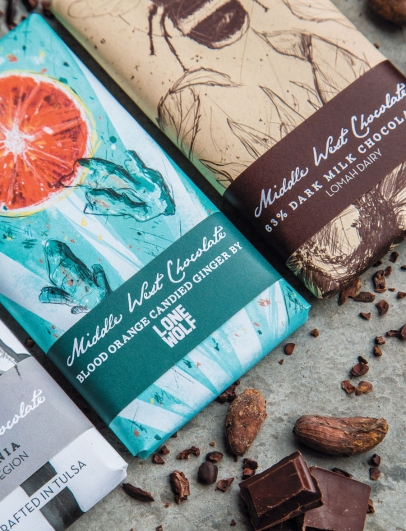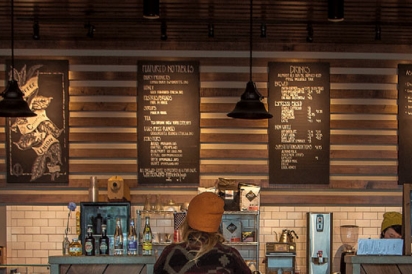Seriously Foolish Things
Coffee Shop Owners Craft Bean-to-Bar Chocolate
There was a time when press-pot coffee was enough for us. When “local coffee” meant knowing the name of the barista at your local coffee shop; it didn’t demand you know the name of the family that grew your coffee beans. When you were expected to present yourself fully clothed in shirt and shoes, but weren’t presented with coffee-ordering guidelines at the register and pressured to drink your coffee black … and like it.
When Justin and Katie Carpenter opened their coffee shop four years ago, they wanted to take their product seriously without taking themselves too seriously. The name, Foolish Things Coffee Co., is meant to embody those simple coffee shop pleasures: a good cup of joe, a good conversation, a good book in good light. But with so many coffee shops, all taking coffee as seriously as the next guy, the Carpenters wanted to expand their business in a way that would set them apart. They briefly considered coffee roasting but didn’t want to compete with their peers, who they felt were already doing great work in that field. Instead, they decided to set out into uncharted territory: chocolate.
“I had no idea how chocolate was made when we first started,” Justin says of their latest project. “My wife and I are both very curious people and we just decided to do a bunch of research and, as people obsessed with food and how things taste and how complexity works, it was down the rabbit hole we go. It was perfect for us.” Middle West Chocolate officially launched a year ago and is the region’s first craft, bean-to-bar producer. The Carpenters source their cacao from a boutique importer in the Pacific Northwest that only deals with responsible producers. The importer pays the cacao producers approximately 30% more than commodity pricing.
“The pricing model for so many things is: ‘How can we package it quickly and cheaply?’—and it usually takes advantage of the producers at origin,” Justin explains. The cacao used in Middle West bars is leveraged by the Tanzanian producer to invest in the community: building roads, schools and operating orphanages. For the Carpenters, this is an important piece of their product’s storyline. Now on their third 150-pound bag of cacao beans, Middle West is still operating on a very small scale, with the roasting and crafting taking place in the back of the coffee shop. The beans are roasted using a repurposed coffee roaster, then loosely crushed to separate the hull from the cacao nibs. Next, the nibs are combined with organic cane sugar and refined in a granite stone mill. As heat builds up through the refining process, the natural oils from the cacao are released to create a smooth, buttery texture. Once refined, the chocolate is allowed to cool and age before being tempered and poured into molds. Their single-origin 72% dark chocolate bar has only two ingredients: roasted cacao and organic cane sugar.
“There’s usually one coffee that everyone can point back to and say, ‘Wow, I didn’t know coffee had those notes in it.’ And the same is true with our Tanzanian [chocolate],” Justin says. “We wanted something that would help people to understand what bean-to-bar or higher-quality chocolate really consisted of.”
True enough, this chocolate lacks the bitterness one usually expects from a dark chocolate. It’s surprisingly smooth, with a creamy texture and vibrant notes of citrus. The Carpenters have made every effort to highlight this chocolate’s flavor profile by partnering with other local artisans to create “inclusion bars.” The blood orange candied ginger produced with Lone Wolf draws out the citrus, while the milk chocolate with Lomah Dairy emphasizes creaminess, and the edible organic seasonal flowers of Ever Something lifts the floral aroma. For Justin and Katie, it’s fun to showcase what makes Tulsa special through these unique blended chocolate bars.
“So much of culture—the perception, anyway—is that culture is defined by what goes on on the East and West Coasts, and that trickles down here. And this is one of those things that we said, ‘You know what? We almost want to shrug off that perception and say we’re proud of where we’re from in the middle of the country, in the perceived fly-over states, and we can create something.’” Hence, the name Middle West Chocolate.
When the Carpenters launched a year ago there were fewer than 200 specialty chocolate makers across the United States. Compare that to coffee roasters—serious coffee cities like Portland, Oregon, boast around 150 roasters in the city limits alone. Justin estimates that specialty chocolate is about 10 to 15 years behind coffee in terms of standards and even production equipment.
“In my limited expertise, it’s still kind of the wild west,” he says, in his deeply Oklahoman drawl.
And he hopes Middle West will be on the leading edge of that frontier.






